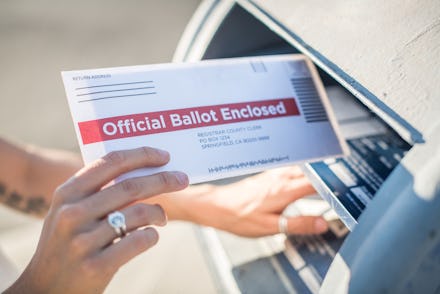A ruling on “naked ballots” could cause massive voter disenfranchisement in a swing state

With the 2020 presidential election rapidly approaching, states are scrambling to get their mail-in voting systems in order — a process that has been marked by lawsuits across the country. And the results of one such lawsuit has an election official raising a big red flag. Last week, the Pennsylvania Supreme Court ruled on a number of issues regarding mail-in voting, including extending the state's absentee ballot deadline and allowing mail-in ballot drop boxes — decisions that were seen as wins for Democrats. But now, Lisa Deeley, chair of the Philadelphia city commissioners, is warning that a largely ignored "naked ballot" ruling could cause massive voter disenfranchisement.
The ruling — based on a law that requires mail-in voters to send their ballots inside envelopes that shield their name — orders officials to reject "naked ballots," or those without such an inner secrecy envelope. According to CNN, state election officials previously told counties to count naked ballots; but the Supreme Court's ruling gave the opposite guidance, allowing those ballots to be rejected in the upcoming election.
On Monday, Lisa Deeley sent a letter to the Pennsylvania House Speaker Bryan Cutler (R) and and state Senate President Joseph Scarnati (R), warning that the new requirement could make Pennsylvania the "subject of significant post-election legal controversy, the likes of which we have not seen since Florida in 2000."
In her letter, Deeley wrote that 6.4% of Pennsylvania's ballots in the 2019 general election were naked. Using this figure, she estimated that up to 40,000 ballots could be thrown out in Philadelphia alone, and over 100,000 votes could be discarded across the state.
"This is not a partisan issue. We are talking about the voting rights of our constituents, whether they be Democrats, Republicans, or independents, whose ballots will be needlessly set aside,” Deeley wrote. “Anyone who advocates doing nothing to address this situation, in hopes that more Democratic ballots are thrown out than Republican ballots, is not being an effective policy maker and is not doing their job to make sure that this election goes off well.”
The state's recent Supreme Court ruling marks a shift from how this issue has been handled previously, including this year. The Hill reported that in the 2020 presidential primaries, the Pennsylvania Department of State advised county election officials to count naked ballots, although they were ultimately given the freedom to decide whether or not they would do so.
But the state leadership doesn't seem inclined to budge. Michael Straub, Cutler's communications director, told CNBC in an email that the Supreme Court was “very clear in its ruling last week that the law requiring a proper secrecy envelope is clear and fair," adding, "we believe this issue is settled for this election.”
Given the coronavirus pandemic, many people are voting by mail for the first time and may not be familiar with the process, and the Supreme Court ruling could effectively punish them for that. “I think people are still getting used to how they work and some people don’t realize there’s a secrecy envelope enclosed," Sara Mullen, the advocacy and policy director at the American Civil Liberties Union (ACLU) of Pennsylvania, told The Hill. "It’s just incumbent on those of us who are doing outreach and education to let people know the importance of that envelope.”